Proton Pass Business Review 2026: Password Management & Secure Documentation for Small Business
Proton Pass Business review after 2+ years of implementation. Now with CLI access and Proton Sheets ecosystem. Password management, encrypted notes, pricing from $1.99/user/month, and implementation guide.
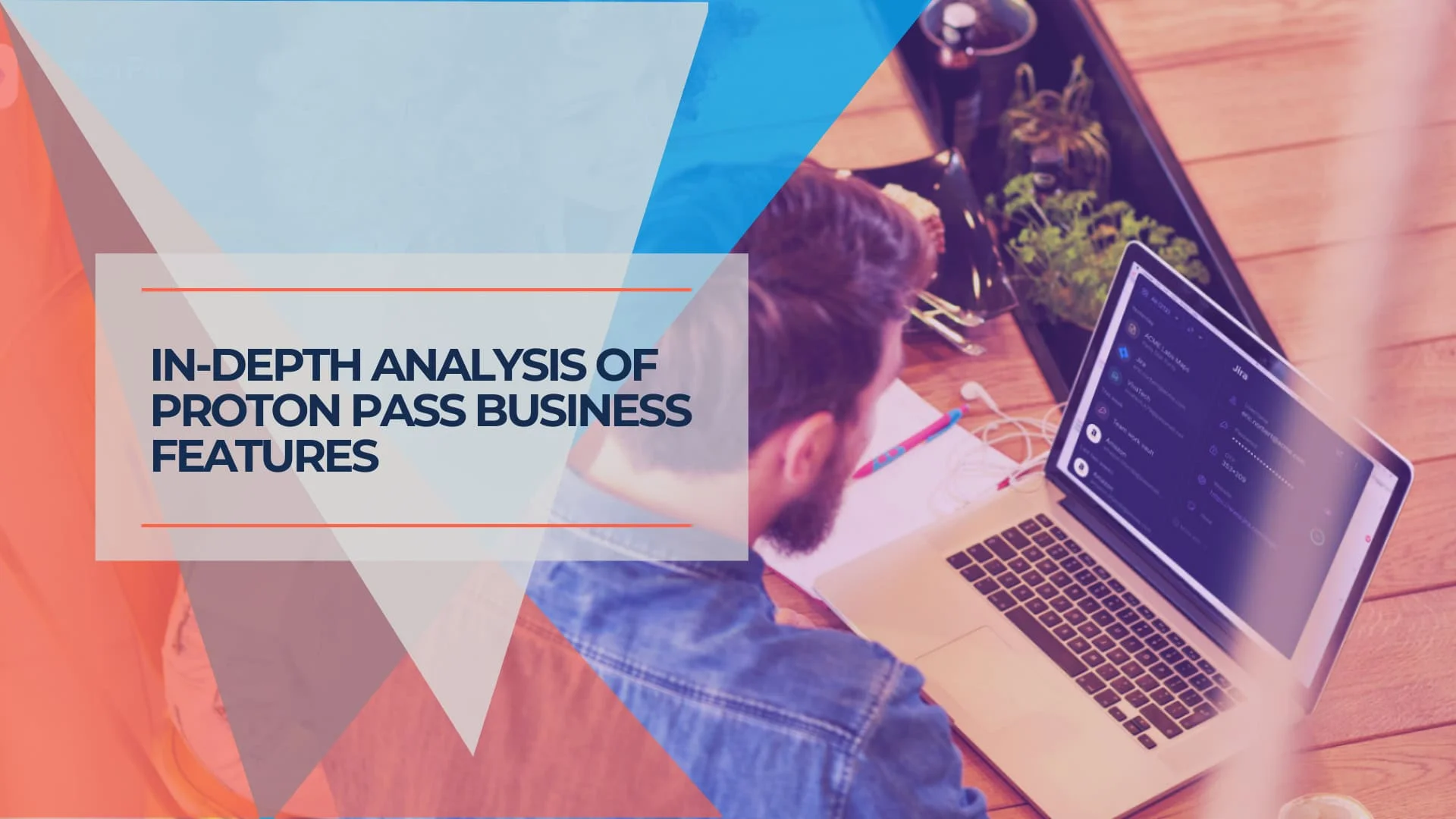
Proton Pass Business is an end-to-end encrypted password manager from Swiss-based Proton AG, starting at $1.99/user/month, with zero-knowledge encryption covering all data including metadata. After two years of deploying it across small business technology projects in South Florida, we've found it excels not just at credential management but as a secure project documentation platform.
This review covers security architecture, pricing, and practical implementation based on our direct experience using Proton Pass for network installations, office setups, and client information management.
Implementation Insight
Our most valuable discovery after 2+ years: Proton Pass works as a full encrypted project documentation system, not just a password vault. The secure notes feature combined with vault sharing fills the gap between insecure note-taking apps and limited password managers. The newer Proton Pass CLI adds programmatic credential access, making it useful for IT deployment workflows as well.
Affiliate Disclosure: This article contains affiliate links. If you make a purchase through these links, we may earn a small commission at no extra cost to you.
Quick Assessment
| Aspect | Details |
|---|---|
| Rating | 4.7/5 |
| Best For | Organizations prioritizing data privacy, Swiss legal protection, and secure project documentation |
| Price | $1.99-$4.49/user/month (annual billing) |
| Key Strength | Zero-knowledge encryption of passwords and metadata, with excellent secure notes capability |
| Main Limitation | Newer market presence means some enterprise features are still under development |
Bottom Line: Proton Pass Business delivers enterprise-grade password security with zero-knowledge encryption at competitive pricing. The Proton ecosystem — now including Sheets, Docs, Mail, Drive, and VPN — makes it particularly valuable for organizations seeking a private alternative to Google Workspace. The encrypted notes feature provides a unique solution for secure project documentation. To compare Proton Pass against 1Password, NordPass, and Bitwarden for small business deployment, see our Best Password Manager for Small Business comparison.
What Is Proton Pass Business?
Proton Pass Business is the enterprise offering from Proton AG, the Swiss company that pioneered privacy-focused business tools with Proton Mail. It provides password management designed for organizations requiring demonstrable privacy protection beyond what mainstream password managers offer.
Key advantages: Swiss privacy protections under DPA and GDPR, end-to-end encryption that extends to all metadata (not just passwords), and integration with Proton's business ecosystem spanning email, calendar, storage, VPN, Sheets, and Docs.
Core Capabilities
Password Management Fundamentals:
- Unlimited password, credit card, and secure note storage across all business tiers
- Browser extensions for Chrome, Firefox, Edge, and Safari
- Native mobile applications for iOS and Android with biometric unlock. Autofill works reliably in most business apps (Slack, Zoom, Microsoft Teams) and web portals; occasional manual paste is needed for apps with non-standard login forms
- Desktop applications for Windows, macOS, and Linux
- Automatic synchronization across all devices
Business-Specific Features:
- Up to 50 vaults per user (Professional and Business Suite plans)
- Vault sharing with up to 10 people per vault
- Granular access controls (view, edit, manage permissions)
- Administrative dashboard for user management and policy enforcement
- Activity logging and audit trails for compliance requirements
- SCIM and SAML integration for identity provider synchronization
- Proton Pass CLI for programmatic credential access and IT automation
Integrated Security Tools:
- Built-in two-factor authentication (2FA) authenticator with automatic autofill
- Unlimited hide-my-email aliases for privacy protection
- Dark Web Monitoring scanning for compromised credentials
- Proton Sentinel advanced account protection — combines AI with human-verified login review to detect and block account takeover attempts in real-time (Professional and Business Suite plans)
- Password health monitoring and weak password alerts
- Passkey support for passwordless authentication
Why Companies Need a Business Password Manager 2026
What Features Does Proton Pass Business Offer?
Proton Pass Business provides unlimited encrypted vaults, native 2FA with autofill, and a CLI for IT automation, all protected by Swiss privacy standards.
- Secure Sharing: Share vaults with unlimited users; permissions (view, edit, manage) can be revoked instantly from the admin dashboard.
- Identity Management: Create unlimited "hide-my-email" aliases to prevent spam, phishing, and cross-site tracking for your entire team.
- IT Automation: The Proton Pass CLI allows developers to programmatically access credentials — streamlining deployment scripts, CI/CD pipelines, and infrastructure provisioning workflows. (Detailed in the CLI section below.)
- Pass Monitor: A dedicated admin dashboard to identify weak passwords, reused credentials, and accounts without 2FA across the organization. Admins can export audit logs for compliance reporting (HIPAA, SOC 2) and receive actionable breach monitoring alerts when credentials appear in Dark Web data leaks.
- Cross-Platform: Native apps for iOS, Android, Windows, macOS, and Linux, plus browser extensions for Chrome, Firefox, Edge, and Safari. All devices sync automatically.
- Passkey Support: Passwordless authentication via passkeys, reducing reliance on master passwords for supported services.
Beyond Passwords: Using Proton Pass for Secure Project Documentation
Here's how the documentation workflow actually looks in practice, using IT project deployments as the example.
Real-World Implementation: IT Project Documentation
Every network installation, office setup, or cloud migration generates sensitive data that needs a secure home immediately — router credentials, WiFi passwords, vendor accounts, license keys, API tokens, configuration notes, and installation procedures.
Traditional approaches create security vulnerabilities:
- Installation notes scattered across email, Slack, or text files
- Passwords written on sticky notes or unsecured documents
- Configuration details buried in multiple locations
- Team members unable to find critical information during troubleshooting
- Security gaps when organizing documentation after project completion
Our Workflow: Security-First Documentation
Step 1: Create Project Vault
We create a dedicated Proton Pass vault for each new implementation before starting work. For example: "Miami Beach Office Network Installation – February 2026"
Step 2: Document as You Deploy
Every sensitive detail goes directly into encrypted notes within the vault:
- UniFi router admin credentials and local IP addresses
- ISP account information and static IP configurations
- WiFi network names, passwords, and VLAN configurations
- Email server settings and DNS records
- Cloud service API keys and integration credentials
- Vendor support phone numbers and account IDs
- Installation procedures and configuration decisions
Step 3: Share with Project Team
The vault is shared only with technicians working on that specific project. When the installation is complete, we adjust access permissions—keeping the vault available for future maintenance while removing temporary team members.
Step 4: Long-Term Secure Reference
Two years later, when troubleshooting network issues or performing upgrades, all critical information remains instantly accessible in its original secure location. No need to search through old emails or recreate lost passwords.
Why This Approach Works
Security by Default: Sensitive information is encrypted from the moment it's documented, not after project completion when organizing scattered notes.
Team Collaboration: Multiple technicians can access the same secure vault during implementation, reducing the need for unsafe credential sharing via email or messaging apps.
Knowledge Retention: When team members leave or transition to other projects, institutional knowledge remains securely documented rather than lost.
Compliance Documentation: For regulated industries requiring documentation of who accessed what and when, Proton Pass activity logs provide the necessary audit trails.
Client Confidence: When clients ask how we handle their sensitive information, demonstrating end-to-end encrypted documentation builds trust in a way that traditional note-taking tools don't.
Notes Feature Implementation Details
Proton Pass notes support limited markdown formatting, allowing structured documentation with headers, lists, and code blocks. The unlimited storage capacity means even comprehensive installation procedures—including network diagrams, configuration scripts, and troubleshooting steps—fit comfortably within individual notes.
Each note can contain up to 25,000 characters, sufficient for detailed technical documentation. The search functionality works across all note content, making information retrieval fast even with hundreds of documented projects.
Implementation Tip
Create standardized note templates for common project types. For network installations, we use a template that includes sections for Network Equipment Credentials, ISP Information, WiFi Configuration, Security Camera Details, VoIP Setup, and Troubleshooting Contacts. This consistency improves team efficiency and ensures nothing is forgotten during documentation.
Use Cases Beyond IT Projects
The secure notes approach extends to numerous business scenarios:
- Client Onboarding: Store client-specific access credentials, account details, and communication preferences in dedicated vaults
- Vendor Management: Document vendor portal logins, support contacts, contract details, and escalation procedures
- Emergency Procedures: Maintain encrypted documentation of critical system access for disaster recovery scenarios
- Compliance Records: Store security assessment findings, penetration test results, and remediation documentation
- Development Projects: Securely document API keys, database credentials, staging environment access, and deployment procedures
- CI/CD and Deployment Automation: Use the Proton Pass CLI to programmatically retrieve credentials during deployment scripts, replacing hardcoded secrets in code repositories
Proton Pass CLI: IT Automation for Credential Management
The Proton Pass CLI (launched November 2025) adds programmatic vault access for IT teams and developers. It allows credential retrieval from the command line, enabling:
- Deployment scripts that pull database passwords, API keys, and service credentials directly from encrypted vaults instead of environment files
- Infrastructure provisioning workflows where credentials are injected at runtime rather than stored in plaintext configuration
- Automated secret rotation as part of scheduled maintenance procedures
For our IT documentation workflow, the CLI validates the approach we've been using for two years — credentials stored in Proton Pass are now accessible both through the GUI for manual reference and through the CLI for automated processes.
After two years of using Proton Pass primarily for this secure documentation workflow, we've found the platform's combination of encrypted storage, team collaboration, granular access controls, and now CLI automation addresses a gap that conventional password managers and note-taking tools leave unfilled.
Is Proton Business Suite Worth the Upgrade?
The Proton Business Suite is worth the investment for organizations seeking a private alternative to Google Workspace, now that it includes Proton Sheets (compatible with standard .xlsx files) and Proton Docs for real-time collaboration.
At $12.99/user/month, the Suite consolidates six privacy tools into one subscription. The addition of Proton Sheets (launched December 2025) and Proton Docs addresses what was previously the biggest gap for businesses considering a move away from Google or Microsoft ecosystems.
| Standalone Approach | Proton Business Suite |
|---|---|
| Separate vendor for email | Encrypted Proton Mail with password-protected emails |
| Third-party VPN required | Integrated Proton VPN (10 connections per user) |
| External cloud storage | Secure Proton Drive (1 TB per user) |
| Calendar via other providers | Encrypted Proton Calendar with meeting scheduling |
| Google Sheets / Excel Online | Proton Sheets (standard .xlsx support, end-to-end encrypted) |
| Google Docs / Word Online | Proton Docs (real-time collaboration, encrypted) |
| Multiple security policies | Unified security framework across all services |
Value Math: Purchasing a separate business VPN ($8/mo), encrypted storage ($10/mo), password manager ($4/mo), and encrypted email ($8/mo) would cost approximately $30/user/month. Proton delivers the full stack for $12.99 — roughly 57% less.
Unified Admin: Manage user access for email, storage, passwords, and collaboration tools from a single control panel, simplifying onboarding and offboarding.
For a full breakdown of the Suite, see our Proton Business Suite review.
Is Proton Pass Business Secure?
Proton Pass Business uses end-to-end encryption for all data, including metadata like URLs and usernames, ensuring zero-knowledge privacy where even Proton cannot access your information.
Unlike competitors that often leave metadata unencrypted, Proton secures every field. The platform operates under Swiss privacy laws (DPA) and GDPR, offering legal protections against data overreach that US-based providers generally cannot provide. All cryptographic operations occur locally on user devices before data reaches Proton's servers.
Encryption Standards:
- AES-256-GCM encryption for all stored items, providing both confidentiality and authenticity verification
- bcrypt password hashing offering superior security compared to PBKDF2 implementations used by some competitors
- Hardened Secure Remote Password (SRP) protocol, limiting attackers to one password guess per attempt, even with network interception capabilities
- Per-vault encryption keys ensure shared vaults remain isolated from other organizational data
Independent Security Validation
Security is verified through independent audits by Cure53 (2023) and confirmed by SOC 2 Type II (July 2025) and ISO 27001 (May 2024) certifications. Cure53 assessed all Proton Pass mobile applications, browser extensions, and the underlying API, commending the platform for its "extensive and thorough security assessment." The SOC 2 Type II certification, conducted by Schellman, confirmed that Proton's security controls are both implemented and consistently followed in practice.
Proton is fully GDPR-compliant under the Swiss Federal Act on Data Protection and supports HIPAA requirements for healthcare organizations. For high-risk accounts, the Proton Sentinel feature adds human-verified login protection beyond standard 2FA.
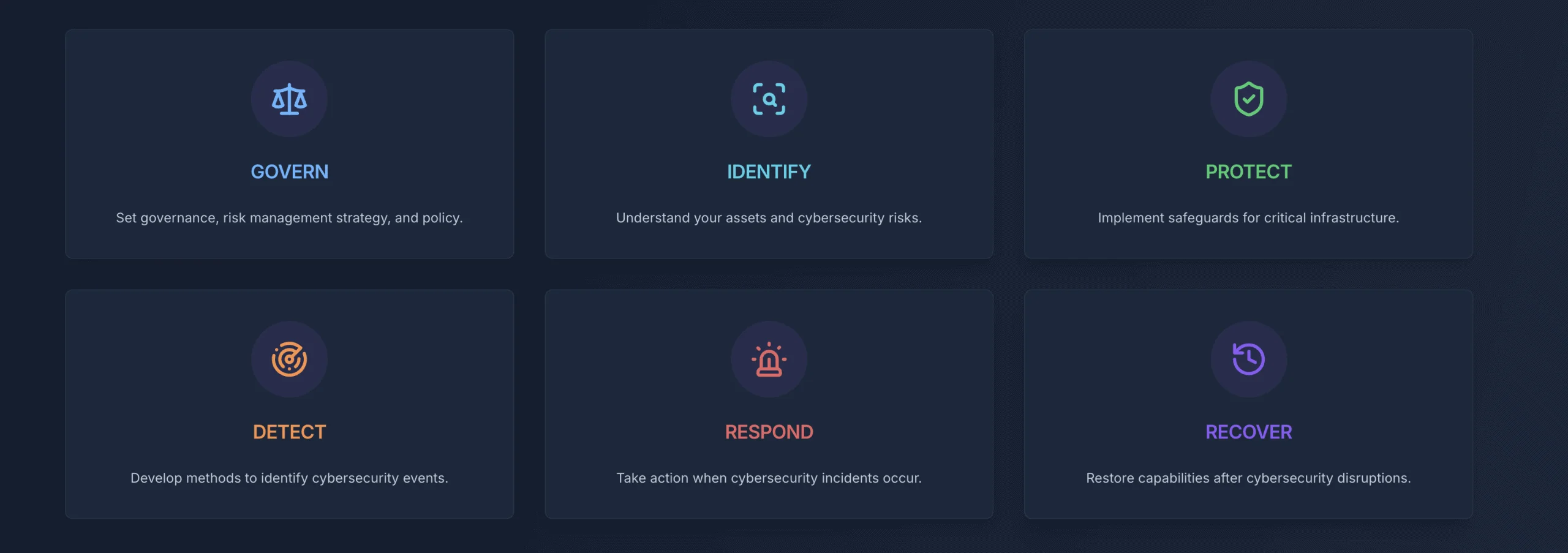
NIST Framework Alignment
For organizations implementing NIST Cybersecurity Framework guidelines, Proton Pass addresses multiple control areas:
Govern: Administrative panel provides comprehensive user management, policy enforcement, and access controls. Activity logging supports governance and risk management processes through detailed audit trails.
Identify: The Security dashboard provides visibility into password health and potential vulnerabilities. Dark Web Monitoring identifies when stored credentials appear in data breaches.
Protect: End-to-end encryption, multi-factor authentication, password generation, and secure sharing provide comprehensive protective measures. Proton Sentinel adds AI-powered account protection against takeover attempts.
Detect: Activity monitoring, breach alerts, and usage logging provide detection capabilities for password-related security incidents.
Respond: Administrative controls enable rapid response, including immediate access revocation, password change enforcement, and session termination.
Recover: Emergency access features, account recovery procedures, and business continuity capabilities ensure organizations maintain access during security incidents.
Implementation Analysis
Requirements Assessment
Technical Prerequisites:
- Modern web browsers supporting current security standards (Chrome, Firefox, Edge, Safari)
- Mobile devices running iOS 12+ or Android 8+ for mobile applications
- Network connectivity for cloud-based synchronization
- Identity provider infrastructure for SCIM/SAML integration (Professional and Business Suite plans)
Organizational Readiness:
- Clear password policy framework and security requirements documentation
- Employee training resources and user adoption strategy
- Administrative capacity for user management and policy enforcement
- Migration planning for existing password management solutions
Implementation Timeline
Week 1-2: Foundation Setup
- Administrator account creation and organizational configuration
- Identity provider integration (SCIM/SAML) if required
- Administrative policy establishment and security controls configuration
- Pilot user group selection and initial deployment planning
Week 3-4: Pilot Deployment
- Pilot user training and account provisioning
- Password import from existing password managers (supports 1Password, LastPass, Bitwarden, and others)
- Vault structure creation and sharing permission configuration
- User feedback collection and workflow optimization
Month 2: Organization-Wide Rollout
- Phased deployment to remaining user groups with comprehensive training
- Legacy password system migration and consolidation
- Policy enforcement activation and compliance monitoring implementation
- Usage analytics and adoption tracking with targeted user support
Month 3: Optimization and Advanced Features
- User adoption analysis and additional training for low-engagement users
- Advanced feature implementation (hide-my-email aliases, 2FA authenticator integration)
- Security posture assessment and policy refinement
- Integration expansion with business applications
South Florida Implementation Note
For businesses in Miami-Dade and Broward counties, we provide hands-on Proton Pass deployment support, including on-site training, vault organization strategy, and integration with existing IT infrastructure. Our team has implemented Proton Pass for healthcare practices, legal firms, accounting offices, and technology companies throughout South Florida, addressing industry-specific compliance requirements including HIPAA and PCI-DSS documentation needs.
Common Implementation Challenges and Solutions
Challenge: Browser Extension Compatibility with Complex Login Forms
Problem: Some business applications use non-standard login forms or multi-step authentication that the Proton Pass browser extension doesn't autofill correctly.
Solution: For problematic systems, save credentials in Proton Pass but access them manually by opening the extension and copying credentials. Document these exceptions during implementation so team members know which systems require manual credential entry. In our experience, approximately 5-10% of business applications require manual credential access.
Challenge: Team Members Forgetting Master Passwords
Problem: Users accustomed to browser-saved passwords or staying permanently logged in struggle with remembering Proton Pass master passwords.
Solution: Implement a master password policy requiring passphrases (4-5 random words) rather than complex passwords, which are more secure and memorable. Consider requiring biometric unlock on mobile devices to reduce master password entry frequency. For account recovery options, see the Admin Recovery FAQ below.
Challenge: Vault Organization Complexity
Problem: Organizations struggle to determine optimal vault structure, leading to either too many vaults (confusing) or too few (insufficient access control).
Solution: Start with a simple organization: Client Vaults (one per major client), Internal Systems (company infrastructure), Vendor Access (external service accounts), and Team Resources (shared tools). Refine vault structure after 30-60 days based on actual usage patterns.
Challenge: Secure Notes Format Consistency
Problem: Different team members document information inconsistently, making notes difficult to use during troubleshooting.
Solution: Create standardized templates for everyday documentation needs. Save templates as example notes that team members can copy and customize. This consistency noticeably improves information retrieval efficiency.
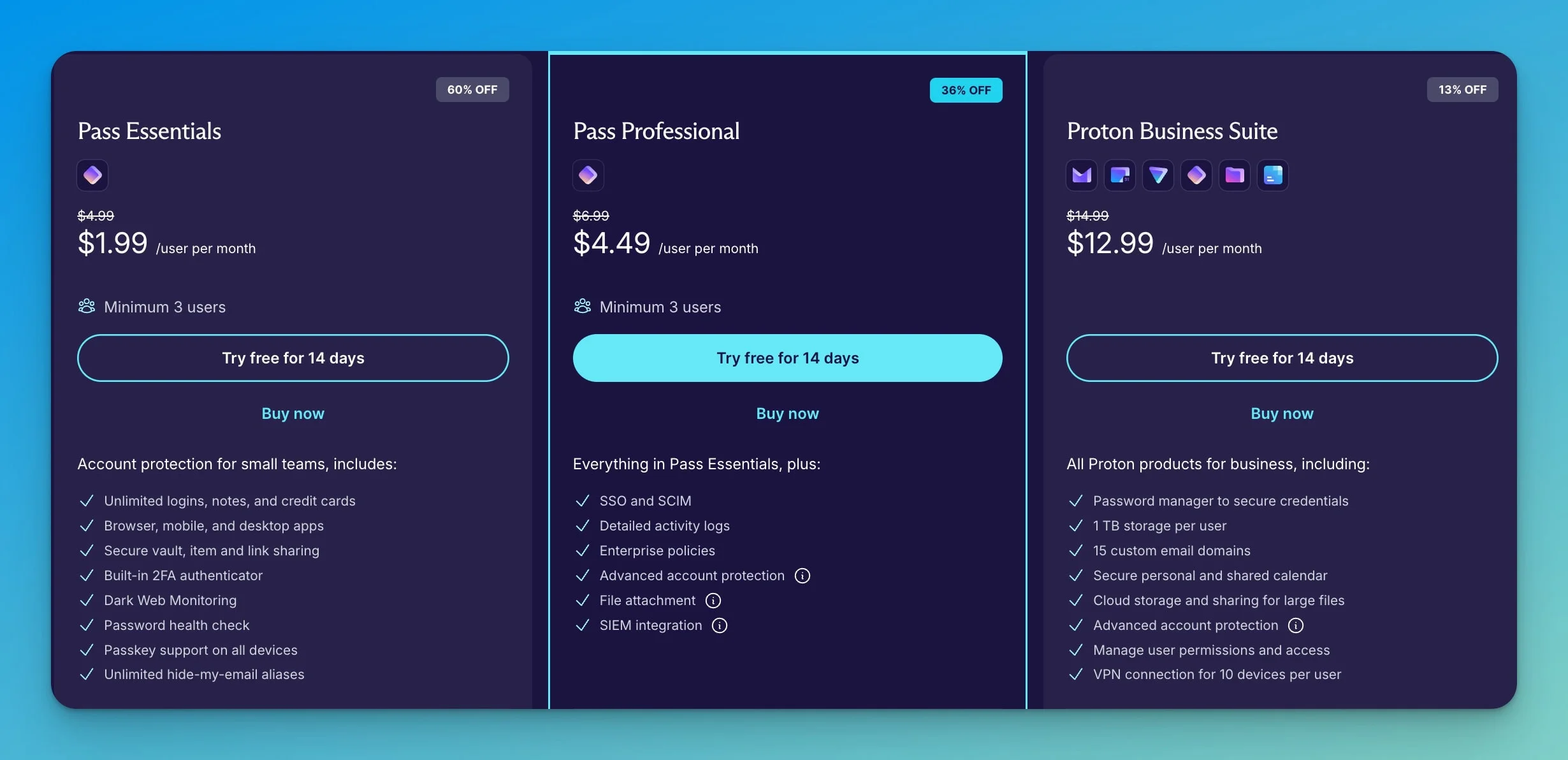
How Much Does Proton Pass Business Cost?
Proton Pass Business costs $1.99 per user/month for the Essentials plan and $4.49 per user/month for the Professional plan when billed annually.
- Pass Essentials ($1.99/user/mo): Unlimited vaults, unlimited devices, breach monitoring, built-in 2FA authenticator, unlimited hide-my-email aliases, passkey support, and basic reporting. Best for small teams needing core security. Monthly billing: $4.99/user/mo. Minimum 3 users. 14-day free trial.
- Pass Professional ($4.49/user/mo): Everything in Essentials plus SSO/SCIM integration, advanced security policies, Proton Sentinel account protection, granular event logs, file attachments, SIEM integration, and priority support. Recommended for regulated industries. Monthly billing: $6.99/user/mo. Minimum 3 users. 14-day free trial.
- Proton Business Suite ($12.99/user/mo): Bundles Pass Professional with encrypted Proton Mail (1 TB storage), Proton Calendar, Proton Drive (1 TB), Proton VPN (10 connections per user), and the newly released Proton Sheets and Proton Docs. Monthly billing: $14.99/user/mo. Minimum 3 users.
- Enterprise Plan: Custom pricing for organizations with 5,000+ users. Dedicated account management and implementation support. Contact sales for pricing.
Cost Comparison: A standalone password manager like 1Password Business starts at $7.99/user/month — nearly double Proton's Professional tier ($4.49), making Proton the budget-efficient choice for pure password management.
Total Cost of Ownership Analysis
Small Business (10 users)
- Pass Essentials: $238.80/year (75% less than 1Password Business at $959/year)
- Pass Professional: $538.80/year (44% less than 1Password Business)
- Business Suite: $1,558.80/year (includes email, calendar, storage, VPN, Sheets, Docs)
Medium Business (50 users)
- Pass Essentials: $1,194/year
- Pass Professional: $2,694/year
- Business Suite: $7,794/year
Large Organization (200 users)
- Pass Essentials: $4,776/year
- Pass Professional: $10,776/year
- Business Suite: $31,176/year
Organizations requiring only password management will find Pass Essentials and Pass Professional competitively priced against NordPass Business ($3.59-5.39/user/month), Bitwarden ($4-6/user/month), and 1Password Business ($7.99/user/month).
For comprehensive productivity platforms, see our detailed Proton Business Suite review, which examines the full integrated approach including email, calendar, storage, VPN, Sheets, and Docs.
Alternative Comparisons
For a broader look at the market, see our best business password managers roundup. Here's how Proton Pass stacks up in a direct comparison:
| Feature | Proton Pass Business | 1Password Business | Bitwarden Business | NordPass Business |
|---|---|---|---|---|
| Annual Cost/User | $1.99-4.49/mo | $7.99/mo | $4.00-6.00/mo | $3.59-5.39/mo |
| Monthly Billing | $4.99-6.99/mo | $9.99/mo | $5.00-7.00/mo | $4.99-7.49/mo |
| Encryption | AES-256-GCM | AES-256 | AES-256 | XChaCha20 |
| Open Source | Yes (full codebase) | No | Yes | No |
| Built-in 2FA | Yes | No | Yes | Yes |
| CLI Access | Yes | Yes | Yes | No |
| Hide-my-email | Unlimited aliases | Limited | No | Limited |
| Security Audits | Cure53 (public) | Multiple (private) | Multiple (public) | Limited disclosure |
| Jurisdiction | Switzerland | USA/Canada | USA | Lithuania |
| SOC 2 Type II | Yes (July 2025) | Yes | Yes | Yes |
| Vault Limits | 50 vaults (Pro) | Unlimited | Unlimited | Good |
| Ecosystem | Full suite (Mail, VPN, Drive, Sheets, Docs) | Standalone | Standalone | Nord Security products |
Proton Pass's combination of zero-knowledge encryption, Swiss privacy protections, CLI access, and open-source transparency provides a unique security and automation profile.
Real-World Use Case
Case Study: Remote-First Technology Startup (35 employees)
Challenge: A rapidly growing startup with globally distributed team members needed comprehensive security tools, including password management, VPN, and secure communication. Managing multiple vendors and security policies created administrative overhead.
Solution: Proton Business Suite deployment provided unified password management, encrypted email, secure cloud storage, and VPN access under a single administrative framework. SCIM integration with the existing identity provider (Okta) automated user provisioning and deprovisioning.
Outcome: Consolidated security spending from $47/user/month (separate password manager, VPN, email, storage) to $12.99/user/month while improving security posture. The unified administrative dashboard reduced security management time by approximately 60%. Annual savings of $14,294 with zero-knowledge encryption across all services.
Need Implementation Support?
Our team helps South Florida businesses implement secure password management and encrypted documentation systems as part of our cybersecurity services. We provide:
- Proton Pass deployment and vault organization strategy
- Password migration from existing systems
- Team training on secure documentation workflows
- Integration with your existing IT infrastructure
Schedule a free consultation to discuss your security requirements.
Our Recommendation
Ideal For:
Organizations Within or Considering Proton Ecosystem Businesses already using or evaluating Proton Mail, Drive, or VPN benefit most from Business Suite's unified approach, which integrates password management into existing workflows without adding another vendor.
Privacy-Conscious Organizations Companies handling sensitive information or operating in industries where client privacy is paramount (healthcare, legal, financial, journalism) benefit from zero-knowledge encryption and transparent security practices.
Regulatory Compliance Requirements Organizations requiring demonstrable compliance with GDPR, HIPAA, ISO 27001, or NIS2 find Proton's certifications, audit trails, and comprehensive documentation valuable for compliance demonstrations.
Budget-Aware Small Teams Small businesses (3-25 users) seeking enterprise-grade security without premium pricing find Pass Essentials at $1.99/user/month or Pass Professional at $4.49/user/month highly cost-effective. For more budget-friendly security stacks, see our guide to building a complete business software stack under $200/month.
Consider Alternatives If:
Maximum Feature Maturity Required Organizations requiring the most polished user interfaces, extensive third-party integrations, or mature enterprise features may find 1Password Business more suitable despite higher costs.
Standalone Password Management Preferred Teams not interested in Proton's broader ecosystem and requiring only password management may find Bitwarden or NordPass offer comparable features without ecosystem coupling.
Extensive Customer Support Critical Organizations requiring immediate phone support or extensive onboarding assistance may prefer competitors offering premium support tiers, as Proton primarily provides email support.
A Balanced Perspective
Greatest Strengths
Transparent Security Architecture Open-source codebase, public security audits, and detailed security documentation provide a level of transparency that proprietary competitors typically don't offer.
Swiss Privacy Protection Operating under Swiss DPA and GDPR provides demonstrable resistance to data access requests from foreign governments — a tangible advantage over US-based alternatives.
Ecosystem Integration Value For organizations adopting Proton Business Suite, the combination of password management, encrypted email, secure storage, calendar, VPN, Sheets, and Docs at $12.99/user/month consolidates multiple vendors into one platform.
Competitive Pricing Structure Pass Essentials at $1.99/user/month and Pass Professional at $4.49/user/month offer enterprise features at affordable pricing for small businesses.
Privacy-First Business Model Subscription-based revenue ensures user privacy remains the primary business incentive rather than data monetization.
Primary Limitations
Newer Market Presence While Proton has operated since 2014, Proton Pass launched more recently than established competitors like 1Password (2005) or LastPass (2008).
Feature Development Pace Certain advanced capabilities, such as folder organization within vaults and advanced autofill for complex forms, remain on the development roadmap. (The CLI has since addressed a previous gap in automation support.)
Limited Third-Party Integrations Fewer direct integrations with business applications compared to more established competitors, though core SCIM/SAML capabilities address primary identity management needs.
Learning Curve for Ecosystem Organizations adopting full Business Suite face larger change management requirements than standalone password manager deployments.
Bottom Line Assessment
Proton Pass Business provides strong password security with zero-knowledge encryption at competitive pricing. It works well for organizations prioritizing transparent security practices and regulatory compliance, backed by SOC 2 Type II and ISO 27001 certifications.
For businesses already invested in or evaluating the Proton ecosystem — especially with the addition of Sheets and Docs — Pass Business is a natural extension that unifies security management across the entire stack. The open-source codebase and public security audits demonstrate a commitment to verifiable security.
Frequently Asked Questions About Proton Pass Business
Is Proton Pass Business worth it for small businesses?
Yes, Proton Pass Business is worth it for small businesses prioritizing security and privacy, particularly at the $1.99/user/month Essentials tier or $4.49/user/month Professional tier. After two years of implementation, we've found the value extends beyond password management—the encrypted notes feature provides secure project documentation that traditional tools don't offer. For teams of 10 users, the annual cost of $238.80 (Essentials) or $538.80 (Professional) is 44-75% less than 1Password Business while providing comparable security.
How does Proton Pass compare to 1Password for business use?
Proton Pass Business offers stronger privacy protection through Swiss jurisdiction and zero-knowledge encryption of all metadata (not just passwords), while 1Password provides more mature features and third-party integrations. Proton Pass costs $1.99-$4.49/user/month versus 1Password's starting price of $7.99/user/month. For organizations prioritizing privacy and cost-effectiveness, Proton Pass is compelling. For teams requiring extensive integrations and polished interfaces, 1Password may justify the premium.
Can Proton Pass handle secure notes for project documentation?
Yes, and this is one of Proton Pass's most underutilized features. Each note supports up to 25,000 characters with limited markdown formatting, sufficient for comprehensive technical documentation. We use secure notes extensively for network installation details, configuration procedures, and client-specific information. The notes are end-to-end encrypted like passwords, searchable across all vaults, and shareable with team members.
Does Proton Pass work for HIPAA compliance?
Proton Pass supports HIPAA compliance requirements through its end-to-end encryption, audit trails, and access controls. The platform provides technical safeguards to protect electronic health information (ePHI). However, organizations must implement proper administrative controls, conduct risk assessments, and sign a Business Associate Agreement with Proton.
How long does Proton Pass implementation take?
Basic implementation takes 1-2 weeks for small teams (under 10 users), including admin setup, user training, and password import. Complete deployment with vault organization, policy configuration, and team adoption typically requires 4-6 weeks. Organizations with existing password managers can use import tools supporting 1Password, LastPass, Bitwarden, and other standard formats.
What happens to shared vaults when employees leave?
Administrators can immediately revoke user access to all vaults through the admin dashboard. When a user is deleted, shared vaults remain with the organization — only the user's Private vault is removed along with their account. The departing user instantly loses access to all shared data. Best practice includes rotating credentials for sensitive systems when team members depart. The activity logs document what each user accessed, supporting security reviews during offboarding.
What happens if an employee loses their master password?
Because Proton uses zero-knowledge encryption, administrators cannot view or reset a user's master password — this is by design to protect privacy. Instead, Proton provides a recovery kit that each user should generate during onboarding. The recovery kit contains a recovery phrase that allows the user to regain access and set a new master password. If a user never created a recovery kit and loses their master password, the admin can delete and re-provision the account, but the user's Private vault data will be lost (shared vault data remains intact with the organization). Best practice: require every user to store their recovery kit in a secure physical location or company safe during onboarding.
Can Proton Pass import passwords from other password managers?
Proton Pass supports importing from 1Password, LastPass, Bitwarden, Dashlane, Keeper, and other prominent password managers. The import process uses CSV files exported from your current password manager. We recommend importing in batches of 200-300 passwords for large datasets to avoid timeout issues.
Does Proton Pass work offline?
Yes, Proton Pass caches encrypted vault data locally, allowing read-only password access without internet connectivity. You can view and copy existing credentials offline, but creating or editing items requires a connection. Changes sync automatically when connectivity is restored. The mobile apps and browser extensions both support offline access. However, initial vault decryption after a fresh installation requires an internet connection.
How many vaults can you create in Proton Pass Business?
Pass Essentials and Pass Professional both allow up to 50 vaults per user, each shared with up to 10 people. This structure provides substantial flexibility for organizing passwords by client, project, department, or security level. Most small businesses use 5-15 vaults.
What's the difference between Proton Pass and Proton Business Suite?
Proton Pass (Essentials or Professional) provides password management only. Proton Business Suite ($12.99/user/month) includes Pass Professional plus encrypted email (1 TB storage), calendar, cloud storage (1 TB), VPN (10 connections per user), and the newly released Proton Sheets and Proton Docs for real-time collaboration. For organizations seeking a complete private alternative to Google Workspace, the Suite consolidates all productivity tools under one admin panel.
Can you try Proton Pass Business before purchasing?
Yes, all Proton Pass Business plans offer a 14-day free trial with full feature access and no credit card required. This provides adequate time to test the platform with real workflows, import existing passwords, configure vault structures, and train team members.
Is Proton Pass open source?
Proton Pass is fully open source, meaning the entire codebase is publicly available for independent security review. This transparency allows security researchers to verify encryption implementation rather than trust vendor claims. Cure53 has independently audited the codebase, with results published publicly.
Does Proton Pass have a CLI?
Yes, the Proton Pass CLI launched in November 2025. It allows developers and IT administrators to programmatically access vault credentials from the command line. Use cases include pulling secrets into deployment scripts, injecting credentials during infrastructure provisioning, and automating secret rotation. The CLI works across Linux, macOS, and Windows, and respects the same vault permissions and access controls as the GUI apps.
This review is based on two-plus years of hands-on implementation experience and current product offerings, pricing, and features as of February 2026. Information verified through Proton's official documentation, independent security audit reports, and established certifications (SOC 2 Type II, ISO 27001).
Related Resources:
Related Articles
More from Business Software
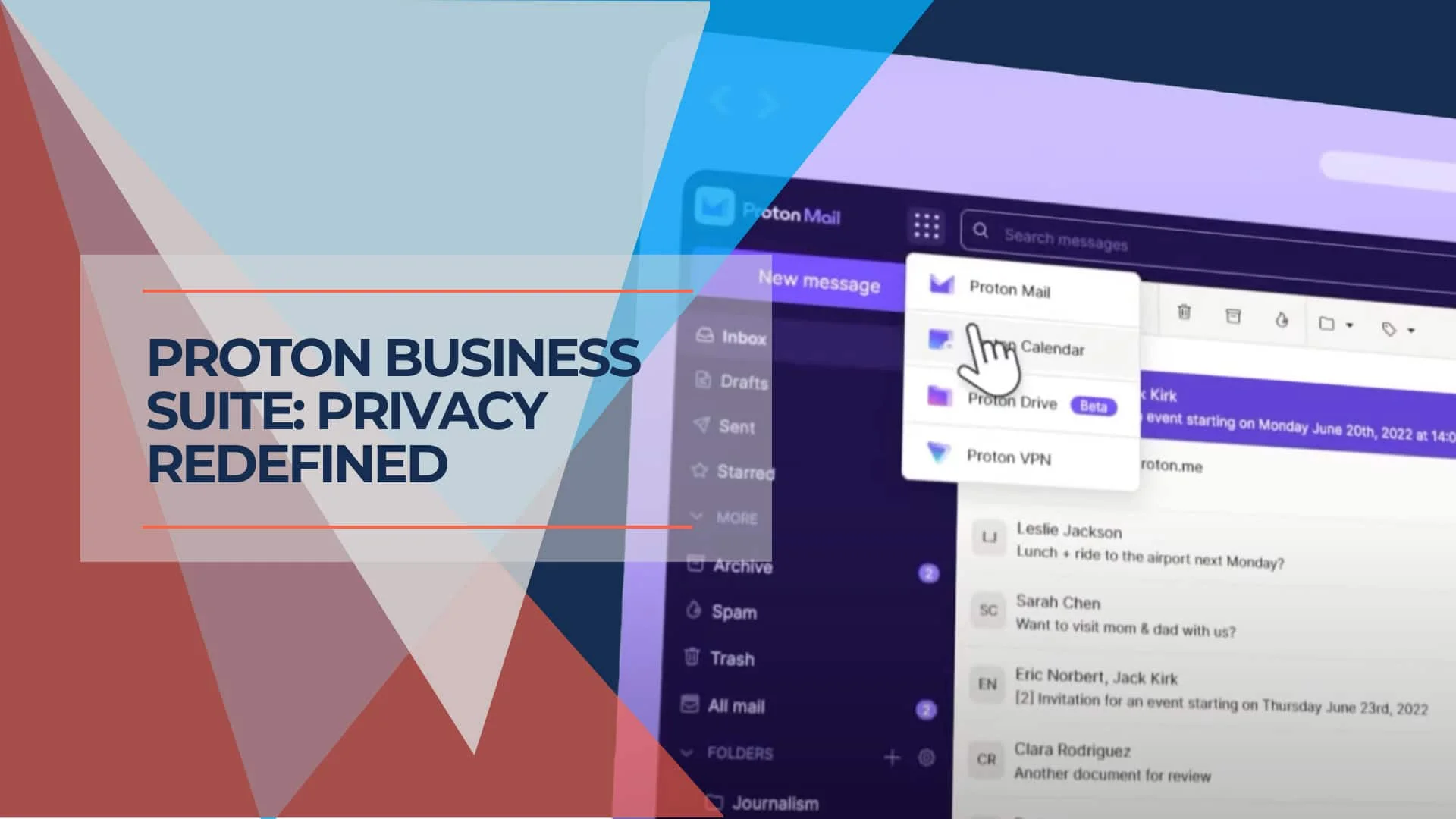
Proton Business Suite Review (2026): The Real Cost of Switching from Google Workspace
Detailed 2026 review of Proton Business Suite. We test Proton Sheets, Lumo AI, and Docs. What does switching from Google Workspace actually involve? SOC 2 Type II certified. $12.99/user/month.
18 min read

HubSpot vs Pipedrive vs Monday: Which Small Business CRM is Best? (2026)
Comparing the top 3 CRMs for small business in 2026 — HubSpot vs Pipedrive vs Monday. Real pricing, setup time, pipeline tools, and free options for teams of 5–50.
19 min read
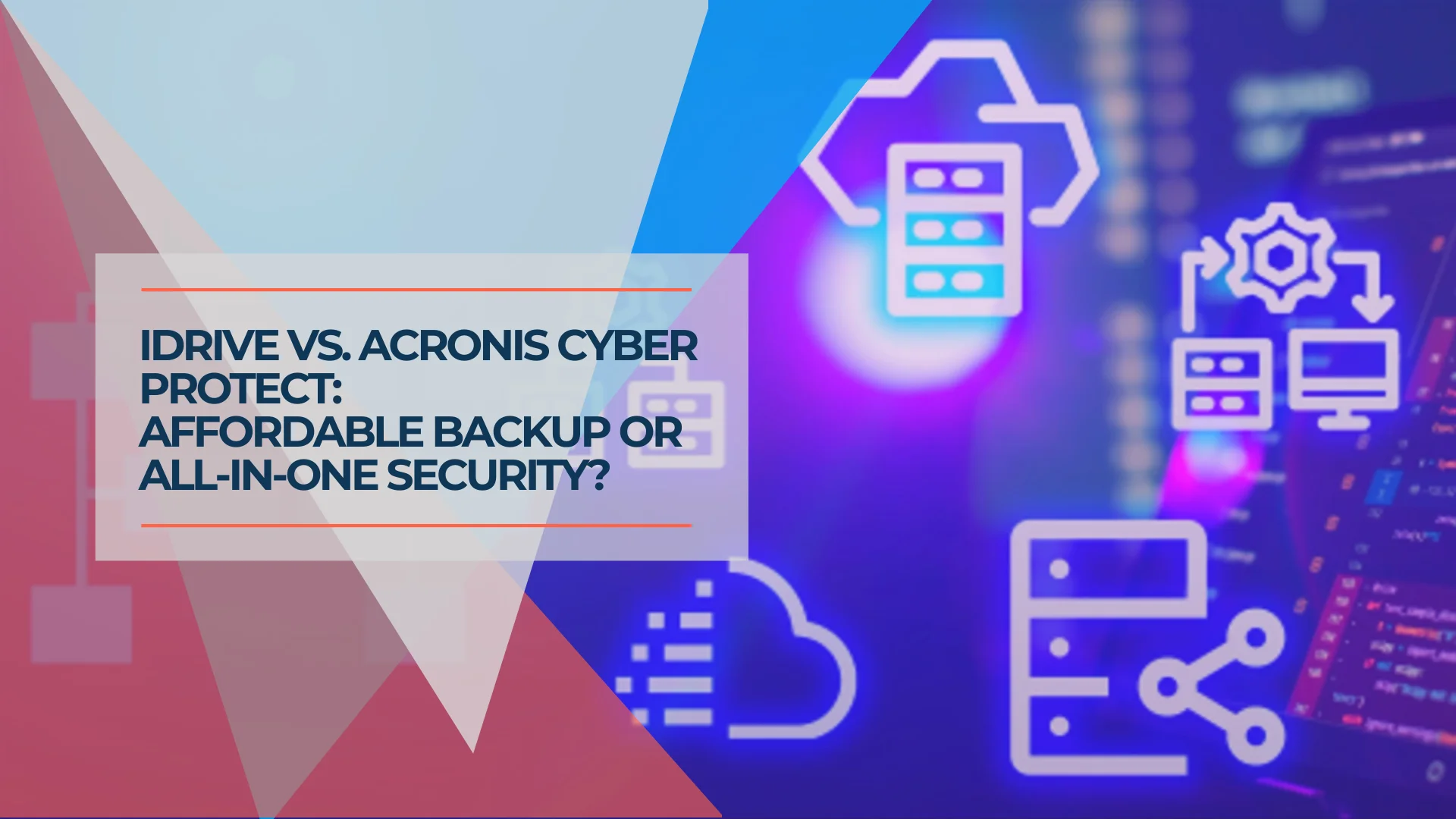
iDrive vs Acronis Cyber Protect 2026: Affordable Backup vs All-in-One Security
We compare iDrive Business and Acronis Cyber Protect for small business backup. Head-to-head on pricing, backup features, security capabilities, compliance, and management.
16 min read
